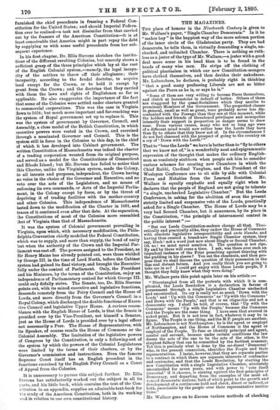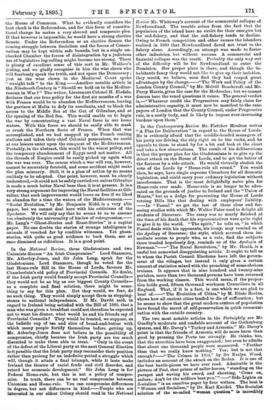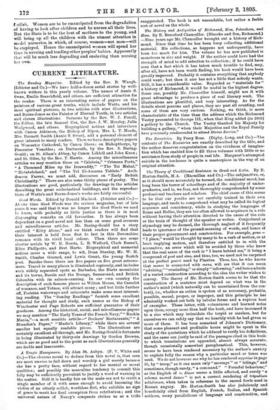THE MAGAZINES.
THE place of honour in the Nineteenth Century is given to Mr. Wallaee's paper, " Single Chamber Democrats." In it he "makes hay" in the happiest way of the more solemn portion of the inner circle of the Gladstonian party. They are bad democrats, he tells them, in virtually demanding a single, un- checked, and unlimited Chamber. There is nothing so ruth- less as a jester of the type of Mr. Wallace,—a jester with a good deal more sense in his head than is to be found in the heads of many wise men. He strips off the clothing of political pharisaism in which our new Constitution-mongers have clothed themselves, and then derides their nakedness. Mr. Labouchere, be declares, is probably right in thinking " that a good many professing Liberals are not so bitter against the Peers as he is, or says he is."
"Some of them are very willing to become Peers themselves, and clutch at baronetcies in default of better. Others of them Are staggered by the quasi-Socialisms which they ascribe to prominent Members of the Government. The propertied classes in general,, small as well as great, were probably never less dis- contented with the Peerage than they are at this moment, while the holders and friends of threatened privileges and monopolies intensify their support in proportion as danger seems to draw near. From various causes, many who not so long ago were of a different mind would now rather bear the Lords they have than fly to others that they know not of. In the circumstances I do not feel charmed with the prospect of going to the country on a cry of Down with the Lords.' "
That to "bear the Lords" we have is better than to "fly to others that we know not of," is a wonderfully neat and epigrammatic expression of the thought that makes the ordinary English- man so resolutely stubborn when people ask him to consider various schemes for creating new Chambers in which the Chief Rabbi, Cardinal Vaughan, and the President of the Wesleyan Conference are to sit side by side with Colonial Peers and Notables from the Learned Societies. Mr. Wallace is equally emphatic and equally right when he declares that the people of England are not going to tolerate "a single, unchecked Legislative Chamber." But the Leeds Conference, in asking for the abolition of even the present strictly limited and suspensive veto of the Lords, practically asked for a Single Chamber. The House of Lords may be a very bad Second Chamber, but it announces, by its place in the Constitution, "the principle of intercameral control in the public interest " :—
" But our Leeds Constitution-makers change all that. Theo- retically and practically alike, they endow the House of Commons with absolute legislative irresponsibility and carte blanche, and having thus created a brand-new Single Chamber system, they say, Hush ! not a word just now about Single or Second Chamber. Oh no ! we must never mention it. The question is not ripe. By and by there will come a time. I ask, was there ever such an impudent instance of the Friar preaching against thieving with the pudding in his sleeve P You eat the chestnuts, and then pro- pose that we shall discuss the question of their possession in the dim and distant future. And you really think you are going to take me in so P I could get angry with these Leeds people, if I thought they fully knew what they were doing."
Mr. Wallace' pats this point again later on his article— "Disentangled from all the pretexts with which it is com- plicated, the Leeds Resolution is a declaration in favour of government through a single Legislative Chamber unchecked and uncontrolled. Its cry is really not so much Down with the Lords' and '11p with the Commons' as 'Up with the Commons' and Down with the People,' and that is an oligarchic and not a democratic cry. I shall be told, of course, that Up with the
Commons' means with the People,' because the Commons and the People are the same thing. I have seen that averred in naked print. But it is not true in fact, whatever it may be in figure. The People is one thing, and the M.P. people are another. Mr. Labouchere is not Northampton ; be is the agent or employe of Northampton, and the House of Commons is the agent or employe of the People. To fuse or identify principal and agent, master and servant, because under certain conditions the law deems the acts of the one to be the acts of the other, is the simplest fallacy that can be committed by the feeblest reasoner. Yet this is precisely what is done by the soi-disant Democrat' who, in the present connection, identifies the People and their representatives. I insist, however, that they are separate parties to a contract in which there are separate interests of contractor and contractee, and that the Leeds Resolution, by starting the new Constitution with a single Legislative Chamber, absolutely uncontrolled for seven years, and with power to ' vote itself immortal' if it chooses, is sinning against the first principles of Democracy, and departing from the examples of the most ad- vanced democratic nations, both of which point to the growth and development of a continuous hold and check, direct or indirect, or both, exercisable by the people over their representative institu- tions."
Mr. Wallace goes on to discuss various methods of checking the House of Commons. What he evidently considers the best check is the Referendum, and for this form of constitu- tional change he makes a very shrewd and temperate plea. If that however is impossible, he would have a strong elective Senate. Under the Referendum or an elective Senate the coming struggle between Socialism and the forces of Conser- vatism may be kept within safe bounds, but in a single un- checked Chamber the forces of disintegration by a judicious use of legislative log-rolling might become too strong. There is plenty of excellent sense of this sort in Mr. Wallace's jesting, and we gladly recognise in him the wise clown who will fearlessly speak the truth, and not spare the Democracy ; just as the wise clown in the Medimval Court spoke 4. straight talk " to the King.—Another notable article in the Nineteenth Century is " Should we hold on to the Mediter- ranean in War P" The writer, Lieutenant-Colonel H. Elsdale, -declares that our true policy for the first six months of a war with France would be to abandon the Mediterranean, leaving the garrison at Malta to defy its assailants, and to block the access to the Middle Sea at the Gut of Gibraltar, and at the opening of the Red Sea. This would enable us to begin the war by concentrating a vast Naval force in our home waters. With this force we should be easily able to mask or crush the Northern fleets of France. When that was accomplished, and we had snapped up the French coaling stations and taken their chief Colonial possessions, we could at our leisure enter upon the conquest of the Mediterranean. Probably, in the abstract, this would be the wisest policy, and the temporary abandonment of Egypt need not matter. All the threads of Empire could be easily picked up again when the war was over. The coarse which a war will ran, however, cannot be accurately foretold, and some accident might make the plan miscarry. Still, it is a plan of action by no means unlikely to be adopted. One point, however, must be clearly understood,—it could not be safely carried out unless Gibraltar is made a much better Naval base than it is at present. It is a very strong argument for improving the Naval facilities at Gib- raltar, that such improvement would leave us free if we liked to abandon for a time the waters of the Mediterranean.
"Social Evolution," by Mr. Benjamin Kidd, is a very able paper, but we cannot deal here with his criticisms of the Spectator. We will only say that he seems to us to assume too absolutely the universality of his law of retrogression.
Mr. Lang's " Ghost-Stories and Beast-Stories" is a capital paper. No one doubts the stories of strange intelligence in animals if vouched for by credible witnesses. Yet ghost- stories, with quite as good evidence to back them, are at once dismissed as ridiculous. It is a good point.
In the National Review, three Gladstonians and two Unionists discuss "An Irish Compromise." Lord Stanmore, Mr. Atherley-Jones, and Sir John Leng, speak for the Gladstonians. Lord Stanmore, though he voted for the last Home-rale Bill in the House of Lords, favours Mr. Chamberlain's old policy of Provincial Councils. No doubt, if the Irish party would frankly accept Provincial Councils— they would not be as big as our biggest County Councils— as a complete and final solution, there might be some- thing to say for this plan. But they would, we fear, do no such thing. They would simply accept them as stepping- stones to national independence. If Mr. Davitt said, in regard to Ireland being satisfied with the Bill of 1886, that a man who was given a breakfast could not therefore be expected not to want his dinner, what would he and his friends say of Provincial Councils P They would be treated, we suppose, as the bedside cup of tea and slice of bread-and-butter with which many people fortify themselves before getting up. Mr. Atherley-Jones does not believe in the possibility of compromise, chiefly because the Irish party are too much disunited to make them able to treat. "Only in the event of the defeat of the Liberal party at the next General Election is it possible that the Irish party may reconsider their position rather than prolong for an indefinite period a struggle which will, though it attain a final triumph, while it lasts make Ireland the theatre of racial feuds and civil disorder, and retard her economic development." Sir John Leng is for Federal Home-rule, but this is not a policy of compro- mise. In truth, there can be no real compromise between Unionism and Home-rule. You can compromise differences in degree, but not differences in kind.—People who are interested in our oldest Colony should read in the National
Review Mr. Whiteway's account of the commercial collapse of Newfoundland. The trouble arises from the fact that the population of the island have no outlet for their energies but the cod-fishery, and that the cod-fishery tends to decline. Owing to French competition and other causes the islanders realised in 1880 that Newfoundland dared not trust to the fishery alone. Accordingly, an attempt was made to foster other industries, but without success. A commercial and financial collapse was the result. Probably the only way out of the difficulty will be for Newfoundland to enter the Dominion. Her proper place is there, and though the in- habitants fancy they would not like to give up their isolation, they would, we believe, soon find they had reaped great advantages by the change.—" The Work and Policy of the London County Council," by Mr. Melvill Beachcroft and Mr. Percy Harris, gives the case for the Moderates; but we cannot discuss here the vexed questions it raises. The general verdict is,—" Whatever credit the Progressives may fairly claim for administrative capacity, it must now be manifest to the rate- payers of London that the County Council, under Progressive rule, is a costly body, and is likely to impose ever-increasing burdens upon them."
In the Contemporary Review Mr. Fletcher Moulton writes " A Plea for Deliberation " in regard to the House of Lords. He is evidently afraid that the muddle-headed managers of his party are driving the ship right on to the rocks, and he appeals to them to stand by for a bit and look at the chart and take a few observations. The result of his deliberations is that the proper plan for the Gladstonians is to give up the direct attack on the House of Lords, and to get the better of the fortress by a side-attack. He would virtually abolish the veto of the Lords by " Home-rule all round." You world then, he says, have single supreme Chambers for all domestic legislation, and could carry your ordinary legislation without interference. That is the most delightfully naive plea for Home-rule ever made. Home-rule is no longer to be advo- cated on the grounds of justice to Ireland and the "Union of Hearts," but as a dodge for preventing the House of Lords vetoing Bills like that dealing with employers' liability. —In " Pascal " we get the last of those clear and far- seeing studies with which Mr. Walter Pater used to delight all students of literature. The essay was so nearly finished at the time of his death that his representatives were quite right to give it to the world. " The spirit," he tells us, " in which Pascal deals with his opponents, his irony, may remind us of the Apology of Socrates; the style, which secured them im- mediate access to people who, as a rule, find the subjects there treated hopelessly dry, reminds us of the Apologia of Newman."—" The Rural Revolution," by Mr. Heath, is a useful but somewhat disappointing article. It ought to tell us to whom the Parish Council Elections have left the govern- ment of the villages, but instead it only gives a certain amount of statistics mixed with the preaching of some obvious truisms. It appears that in nine hundred and twenty-nine parishes, more than two thousand persons have been returned from the working classes. This would mean, if the propor- tion holds good, fifteen thousand workmen Councillors in all England. That, if it is a fact, is one which we are glad to hear of.—" The Evolution of Cities," by M. Elish Reclus, shows how all ancient cities tended to die of suffocation ; but he seems to show that the great modern centres of population have found the secret of self-preservation in quick communi- cation with the outside country.
The two most notable articles in the Fortnightly are Mr. Goadby's moderate and readable account of the Gothenburg system, and Mr. Davey's " Turkey and Armenia." Mr. Davey's point is that the friends of Armenia will do more harm than good by pressing the Porte too strongly. He thinks, too, that the atrocities have been exaggerated; but even he admits that about one thousand people were massacred. "Further than that we really know nothing." Yes; but is not that enough?—" The Crimea in 1854," by Sir Evelyn Wood, includes an account of the attack on the Redan. It is one of the best battle-pieces we have ever read. Admirable is the picture of Peel, that prince of sailor-heroes, " standing on the parapet and waving his sword, and shouting, Come on, sailors; don't let the soldiers beat you.' "—" Side-Lights on Socialism" is an omnibus paper by four writers. The best is " Woman and Socialism," by Dr. Karl Knodel. The Socialist solution of the so-called "woman question" is incredibly f lolish. Women are to be emancipated from the degradation of having to look after children and be nurses all their lives. But the State is to be the best of mothers to the young, and will bring up all the children with the utmost attention in model nurseries, in which, of course, women—not men—will be employed. Hence the emancipated woman will spend her time in nursing and tending other peoples' babies. Apparently that will be much less degrading and enslaving than nursing her own.




































 Previous page
Previous page